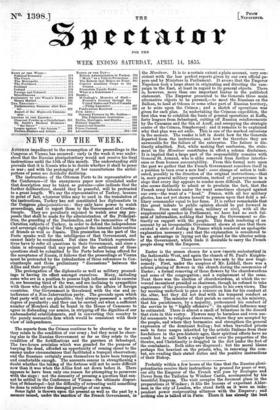Easter is the season chosen for a new emeute ecclesiastical
in the fashionable West, and again the church of St. Paul's Knights- bridge is the scene. There have been two acts to the new tragi- comedy. First, under the auspices of Mr. Liddell, there was a solemn placing of flowers in the church during the ceremonies of Easter ; a formal removing of those flowers by the churchwardens and some of the congregation; and a replacement of the same. Next there was the election of churchwardens, at which the re- verend incumbent presided as chairman, though he refused to take cognizance of the proceedings in opposition to his own views. The lay meeting undertook to pass a censure on him for his conduct at the altar, but they did not deal with his temporal conduct as chairman. The minister of that parish so carries on his ministry, that his parishioners, by a majority, prdhounced his conduct of the service to be " highly offensive": its spiritual influence may be estimated. There is almost a smell of brimstone in the discord that riots in this vestry. Flowers may be harmless and even use- ful ornaments to religious observance, where they are accepted by the people, and where they harmonize and strengthen the general expression of the dominant feeling ; but when travelled priests seek to force usages inherited by the artistic Italians from their forefathers in the pra3-historic ages, their spiritual efforts have no result but to call forth a vulgar brawl over the properties of the theatre, and Christianity is draggled in the dirt under the feet of the combatants. Both aides are disgraced; but the moral blame perhaps lies heaviest on the priests, who, in renewing the com- bat, are evading their stated duties and the positive instructions of their Bishop.


























